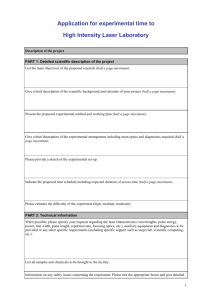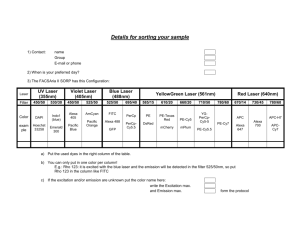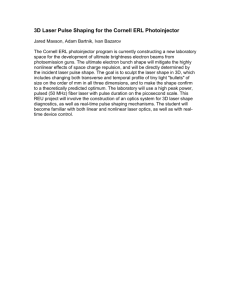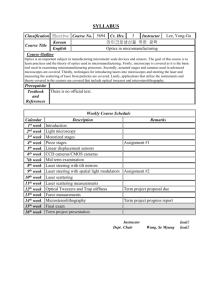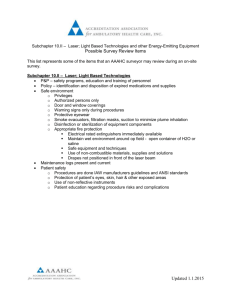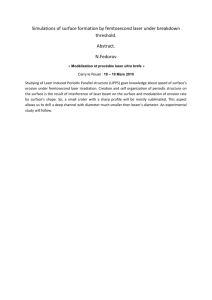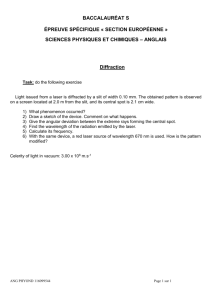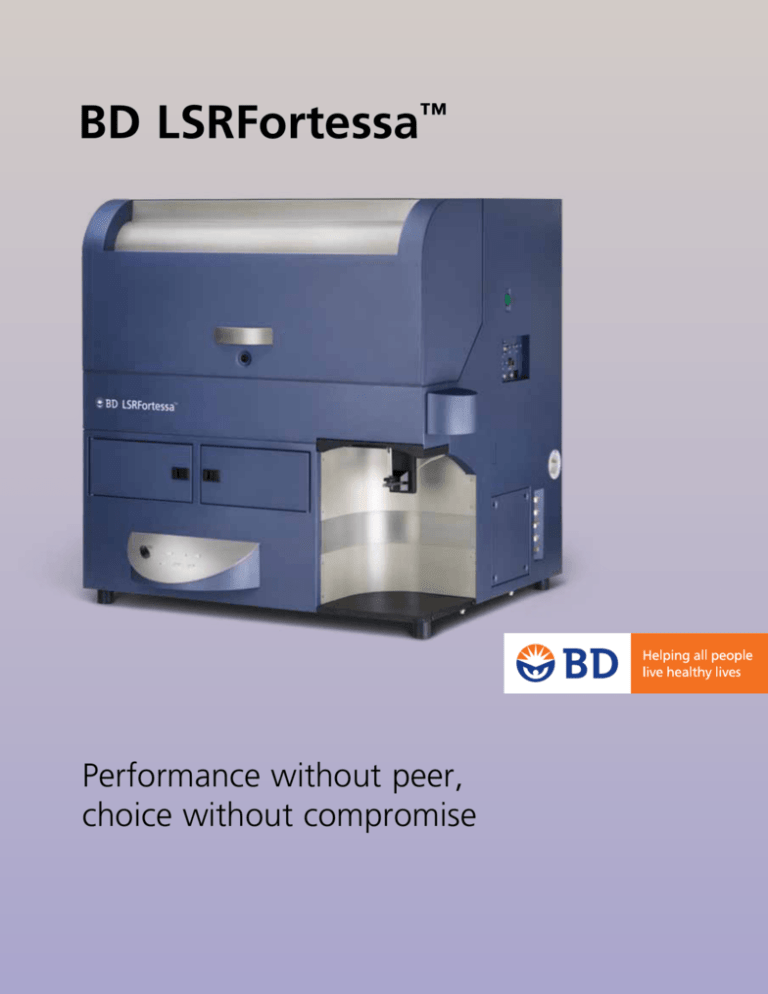
BD LSRFortessa™
Performance without peer,
choice without compromise
Performance without peer,
choice without compromise
The BD LSRFortessa™ cell analyzer offers the ultimate in choice for flow
cytometry, providing power, performance, and consistency. Designed to
be affordable and expandable, the BD LSRFortessa has the flexibility to
support the expanding needs of multicolor flow cytometry assays.
The BD LSRFortessa analyzer can be configured with up to 4
lasers—blue, red, violet, and UV—which enables the detection of up
to 18 colors simultaneously. The BD LSRFortessa may be upgraded
subsequently with additional or new lasers from BD, as future
requirements dictate.
Innovative Designs for Optical Efficiency
Built on a proven platform, BD LSR analyzers
feature innovative designs for both the
excitation optics and collection optics that
reduce excitation losses and improve light
collection efficiency. The result is optical
efficiency that delivers maximum sensitivity
and resolution for multicolor applications
by reducing excitation laser light loss, and
improved fluorescent signal collection.
Special Order Program
For research needs at the leading edge
of biomedical discovery, the special order
program offers BD LSRFortessa researchers
the latest innovations in laser technology
to enable future upgrades with new
excitation, wavelength, and power choices.
The program lets customers fully customize
configurations to deliver added flexibility
and power to support advanced research.
Technical and Application Support
As with all BD instruments and reagents,
highly qualified BD technical and application
support personnel are available for help
in streamlining research and maintaining
optimal instrument performance.
Boundless Potential
The BD LSRFortessa Analyzer
Flexibility in a Small Space
An affordable choice to fit most flow cytometry analyzer
needs, the BD LSRFortessa can be ordered with up to 4
lasers—blue, red, violet, and UV—which provides flexibility
in laser wavelengths so assay design can be optimized using
the latest fluorescent dyes and substrates. The instrument
can accommodate the detection of up to 18 colors
simultaneously with a defined set of optical filters that
meet or exceed the majority of today’s assay requirements.
The BD LSRFortessa is designed to enable your current assay
requirements. As future needs arise, lasers can be added or
upgraded.
The BD LSRFortessa puts the power of the proven BD LSR
platform into a compact footprint. It can easily fit on the
benchtop for cost-effective space use. This space efficiency
is even more important for labs with limited space or where
space cost is premium.
In addition to the reduced size, design enhancements
provide easier access to bandpass filters and mirrors,
simplifying changes to experimental setup.
To improve experimental workflow, the optional
BD™ High Throughput Sampler (HTS) provides rapid, fully
automated sample acquisition from microtiter plates. In
high-throughput mode, the HTS option can speed through
a 96-well plate in less than 15 minutes with less than 0.5%
sample carryover from one well to the next. Low carryover
is essential in research applications to ensure sample purity
and data integrity.
BD High Throughput Sampler (HTS)
Analysis of Regulatory T Cells
4
All Events
Lymphocytes
105
3,500 4,000
CD3+
102
103
104
105
104
103
1,000
500
0
0
CD8 PerCP-Cy5.5
2,500
CD3+
1,500 2,000
Count
3,000
(x 1,000)
250
200
CD4+CD8neg
102
CD3 APC-H7
0
Lymphocytes
50
100
150
FSC
200
250
(x 1,000)
-132
SSC
150
100
-140
50
Regulatory T cells (Tregs) play a critical role
in maintaining immune modulation and are
present in normal peripheral blood in low
numbers (5 to 10% of CD4+ T cells or 1 to
2% of total lymphocytes). Forkhead box P3
(FoxP3) is considered to be the definitive
marker for this rare cell population.
Tregs are known to express the highest
levels of CD25. The CD4+CD25+(high) gating
strategy shown here was used to identify
Treg populations. These plots represent
data taken from a BD LSRFortessa using
an 8-color panel that applies this gating
strategy to identify FoxP3-positive cells.
0 102
102
103
104
CD4 BD Horizon V500
105
BD LSRFORTESSA
CD25+CD127lo
CD4+CD8neg
CD25+CD127lo
CD4+CD8neg
-471
-102 0 102
103
CD25 APC
104
105
104
103
IFNγ+CD4+
#Events %Parent %Total
960,606
####
100.0
238,144
24.8
24.8
108,466
45.5
11.3
63,347
58.4
6.6
4,059
6.4
0.4
3,192
78.6
0.3
3,360
82.8
0.3
699
17.2
0.1
1,921
3.0
0.2
102
-92
101
0
0
102
103
104
FoxP3 Alexa Fluor® 488
105
0
-471
0
-194
-102
-102
0
10
102
CD25+CD127lo
Population
All Events
Lymphocytes
CD3+
CD4+CD8neg
CD25+CD127lo
FoxP3+
CD45RA+CD25+
CD45RAnegCD25+
IFNg+CD4+
102
CD4 BD Horizon V500
103
CD25 APC
40
20
30
Count
104
103
CD127 PE
CD45RA+CD25+
104
50
CD45RAnegCD25+
FoxP3+
Stimulated
105
105
60
105
Tube:
-313
-102 0 102
103
104
CD45RA BD Horizon V450
105
-265
-102 0 102
103
104
105
IFNγ PE-Cy7
5
FLUIDICS
Superior Performance
Unique and Revolutionary Designs
for Multicolor Analysis
Fluidics System
The fluidics system is pressure driven. Hydrodynamic focusing
forces sample cells through the cuvette flow cell, where
they are interrogated. The flow cell is in fixed alignment
with the laser and gel-coupled to the collection optics.
This design ensures that the laser is precisely focused on
the sample stream and the maximum amount of emitted
light can be collected for added sensitivity in multicolor
applications. Fixed alignment also minimizes startup time,
improves experiment-to-experiment reproducibility, and
enables automated daily quality control.
Many innovations are incorporated into the BD LSRFortessa
product line. The heart of the cytometer, the fluidics system
features a true fixed-alignment flow cell that is gel-coupled
to the collection optics to maximize detector signal.
The sheath container (8 L) and waste container (10 L) are
outside the cytometer, and positioned on the floor for
easier access.
The optional BD FACSFlow™ supply system fluidics cart
increases capacity and ease of use while maintaining a stable
fluidics pressure. It includes an automated sheath and waste
fluid control system that reduces daily maintenance by
incorporating two 20-L containers (Cubitainers®).
Fluidic sensors maintain constant pressure, while a fluidics
monitoring system warns when sheath fluid is low or empty,
or when the waste container is full.
Figure A-1 Hydrodynamic focusing of the sample core through the flow cell
Low Sample
Pressure
(12 µL/min)
Laser Beam
High Sample
Pressure
(60 µL/min)
Laser Beam
Figure A-1 Hydrodynamic focusing of the sample core through the flow cell
Low Sample
Pressure
(12 µL/min)
Laser Beam
Sheath
Fluid
Sheath
Fluid
6
Sample
Sample
Sheath
Fluid
Sheath
Fluid
High Sample
Pressure
(60 µL/min)
Laser Beam
Sheath
Fluid
Sheath
Fluid
Sample
Sample
Sheath
Fluid
Sheath
Fluid
Hydrodynamic focusing of the sample
core through the flow cell
Cuvette flow cell
Cuvette
Laser Beams
Cuvette flow cell
Flow Cell
A quartz cuvette flow cell is gel-coupled
to the collection optics. This design helps
ensure that lasers are precisely focused on
the sample stream to generate the greatest
signal and ensure that the maximum
amount of emitted light is collected.
Sample Injection Tube (SIT)
7
OPTICS
Maximum Signal, Minimum Crosstalk
An Innovative and Proven Platform
for Multicolor Analysis
Optics System
The optics system consists of laser excitation optics that
illuminate cells in the sample, and collection optics that
direct light scatter and fluorescence signals through spectral
filters to detectors. Innovative designs for both the excitation
optics and collection optics in BD LSRFortessa systems reduce
excitation losses and optimize collection efficiency for
increased sensitivity and resolution.
The patented collection optics are yet another design
innovation. Arranged in octagon- and trigon-shaped optical
pathways, their novel design efficiently maximizes signal
detection and increases sensitivity and resolution. This
allows researchers to identify cells, especially dim and rare
cell populations, optimizing multicolor assays and panel
design for superior results.
Excitation Optics
The excitation optics consist of multiple fixed wavelength
lasers, beam shaping optics, and individual pinholes which
result in spatially separated beam spots.
A final lens focuses the laser light into the gel-coupled
cuvette flow cell. Since the optical pathway and the sample
core stream are fixed, alignment is constant from day to day
and from experiment to experiment.
Normalized Emission (%)
Emission spectra of commonly used fluorochromes
PerCP
100
PE
AmCyan
80
Alexa Fluor® 700
BD Horizon™ V450
FITC
APC
60
APC-H7
PerCP Cy™5.5
40
PE-Cy™7
20
0
400
8
500
600
700
Wavelength (nm)
800
Collection Optics
Emitted light from the gel-coupled cuvette is delivered
by fiber optics to the detector arrays. The collection optics
are set up in patented octagon- and trigon-shaped optical
pathways that maximize signal detection resulting from
each laser illuminated beam spot. Bandpass filters in front
of each PMT allow spectral selection of the collected
wavelengths. Importantly, this arrangement allows filter
and mirror changes within the optical array to be made
easily and requires no additional alignment for maximum
signal strength.
This design is based on the principle that light reflection is
more efficient than light transmission. Emitted light travels to
each PMT detector via reflection and is transmitted through
only two pieces of glass to reach the detector. Therefore,
more colors can be detected with minimum light loss.
D
B
F
Transmission pathways in an octagon
H
G
A
E
C
9
Greater Consistency
Automated Controls for Setup,
Acquisition, and Analysis
Cytometer Setup and Tracking
The Cytometer Setup and Tracking (CS&T) feature of
BD FACSDiva software establishes baseline settings and
adjusts for instrument variability. The software reduces
operator error, and ensures consistency of results by setting
the signal time delay across the multiple laser beams and
optimizing PMT voltages. Application-specific settings can
also be set, allowing for rapid setup and performance
of routine experiments in a more consistent manner.
Quality control (QC) tracking capabilities in the software
measure instrument settings and report on performance.
Levey-Jennings plots help users understand instrument
performance and identify maintenance issues.
BD FACSDiva™ software controls the efficient setup,
acquisition, and analysis of flow cytometry data from
the BD LSRFortessa workstation. The software is common
across BD FACS™ instrument platforms, including the
BD FACSCanto™ cell analyzer and BD FACSAria™ cell
sorter systems. This affords researchers greater application
flexibility, allowing them to easily move assays from one
platform to another.
Analysis of human blood
Data shows a 10-color panel run on a 3-laser BD LSRFortessa with
a blue/red/violet configuration. The panel was used for defining
T-cell subsets using lysed whole blood (BD Pharm Lyse™ lysing
buffer) from a normal donor. Use of the BD Horizon™ V450 and
BD Horizon V500 dyes allows brighter fluorochromes to be used for
more dimly expressed antigens, while the use of 10 colors expands
the amount of information gained from a single tube.
10
105
0 102
103
TCR αβ FITC
104
105
105
104
103
CD8 PerCP-Cy5.5
104
0
0
105
CD8+ T Lymphs
103
CD8 PerCP-Cy5.5
104
103
102
-466
T Lymphs
0
103
104
CD3 Alexa Fluor® 700
105
-466
0
103
104
CD3 Alexa Fluor® 700
105
-108
0 102
103
104
CD4 BD Horizon V500
105
-45
104
T Lymphs
-693
103
CD45 APC-H7
CD4+ T Lymphs
-693
102
T Lymphs
0
150
SSC
100
50
101
-108
CD4 BD Horizon V500
105
250
T Lymphs
200
(x1,000)
T Lymphs
-108
0
103
104
CD3 Alexa Fluor® 700
105
BD FACSDIVA
Acquisition and Analysis
BD FACSDiva software enables researchers to preview
and record data from multiple samples with an automated
acquisition process. Acquisition templates, user-defined
experiment layouts, and simple compensation procedures
are also managed by the software to further facilitate
acquisition.
LSRFortessa - T Cells
104
103
150
CD2 FITC-A
Grans
100
SSC-A
200
105
250
LSRFortessa - T Cells
Lymphs
102
103
104
-369
50
0 102
Monos
105
0
-597
CD45 V500-A
For analysis, the software includes powerful features such
as hierarchical snap-to gating, a variety of plot formats, and
batch analysis. Recorded data can be analyzed by creating
plots, gates, population hierarchies, and statistics views on a
BD FACSDiva global worksheet. Once the global worksheet
is saved, it can be used to analyze multiple sample tubes
from an experiment, thereby saving time. Numerous other
productivity benefits include user-defined batch analysis
and automated features such as gate resizing, pausing
between data files, exporting statistics, and printing before
proceeding to the next data file.
Tube: T Cells
104
T Helper
103
Population
All Events
Lymphs
T Cytotoxic
T Helper
0
CD4 Alexa Fluor® 700-A
105
104
103
Monos
-722
-351
0
CD8 PE-A
105
LSRFortessa - T Cells
T Cytotoxic
0
-597
103
104
105
0
-597
CD3 APC-H7-A
103
104
105
Grans
CD3 APC-H7-A
104
103
0
-495
-1,435
0
103
104
CD16 PE-Cy7-A
105
LSRFortessa - T Cells
105
LSRFortessa - T Cells
CD56 APC-A
104
105
LSRFortessa - T Cells
103
CD3 APC-H7-A
0
-597
103
104
105
0
-597
CD3 APC-H7-A
103
104
105
CD3 APC-H7-A
BD FACSDiva worksheet showing well defined T-cell population
subsets acquired using the special order BD LSRFortessa analyzer
configured with the following lasers: 60-mW 355-nm UV, 100-mW
450-nm violet, 100-mW 488-nm blue, and 40-mW 640-nm red.
104
105
Tube:
T Lymphs
103
104
Population
All Events
Lymphocytes
CD4+ T Lymphs
CD8+ T Lymphs
0
0
103
CD25 PE-Cy7
104
105
0 102
103
104
CD8 PerCP-Cy5.5
105
T Lymphs
-108
0 102
103
104
CD4 BD Horizon V500
105
-293
0
103
104
CD2 PE-Texas Red®
105
-472
103
-693
0
CD3 Alexa Fluor® 700
-129
CD62L BD Horizon V450
105
104
103
T-Cell γδ APC
0
-1,098
-466
T Lymphs
105
T Lymphs
T Lymphs
-466
0
103
104
105
CD3 Alexa Fluor® 700
11
CUSTOM
Choices Now and in the Future
Special Order Products for Unique Needs
The BD special order program allows customers to configure
BD flow cytometers and cell sorters to fit precise research
and assay needs. Tailored to the special needs of research
at the leading edge of biomedical discovery, the program
offers a wide range of choices to help researchers create
the ultimate customized instrument for their requirements.
Multiple Power Options
Innovative laser options include the choice of solidstate lasers across the full spectrum. Currently, 18 laser
wavelength options are offered, ranging from ultraviolet
to infrared wavelengths. Through the special order
program, researchers can configure a BD LSRFortessa with
up to 7 lasers and 42 positional choices for the detectors.
Forward Scatter PMT Option
The special order program offers a Forward Scatter
(FSC) PMT Option that complements small particle
scatter detection. This option lowers the threshold on
size measurements, which is particularly valuable for
microbiology applications.
Evolving Capabilities
BD LSR customers have an expanded level of flexibility
and choice because they can add lasers after purchasing
a system, to meet new or evolving requirements. This
flexibility makes BD LSR analyzers a solid, long term
investment.
Optimization of Fluorochrome Excitation
These experiments demonstrate the versatility of the 10-laser special
order BD LSR II cell analyzer. Providing the user choices for laser
excitation wavelength, this system adapts to unique user defined
fluorochromes, for optimization of multicolor experiments.
3
10
4
10
10
5
-334
5
10
3
10
2
-10 0 10
2
2
2
-10 010
10
3
10
4
10
5
GR1-A594-0610
-255
2
GR1-A594-0610
0 10
2
2
-10 010
-223
0
-664
-375
10
4
CD11b-PE-YG585
10
10
3
10
4
CD11b-PE-G585
10
10
3
10
4
CD11b-PE-B585
CC
5
BB
5
AA
-375
2
-10 010
2
3
10
10
4
5
10
GR1-A594-0610
Effect of laser excitation on spectral overlap
Cells co-stained with Alexa Fluor® 594 (GR1) and PE (CD11b) were
run using blue 488-nm (B), green 532-nm (G), and yellow-green
561-nm (YG) laser as alternate excitation sources for PE. Alexa
Fluor® 594 was excited using an orange 592-nm laser. Panel A
shows PE excitation with a 488-nm laser, panel B shows excitation
12
with a 532-nm laser, while panel C shows excitation with a
561-nm laser. The 10-laser special order BD LSR II instrument allows
the user to choose the excitation source as well as the excitation
power. Researchers can maximize signal while minimizing the
compensation required to deal with unwanted spectral overlap.
0
Count
An Innovation Process
A vigorous pursuit of the latest and best laser technologies
ensures an unparalleled range of configuration choices
offered by the BD special order program for BD LSR
analyzers. New technologies are regularly incorporated into
the product line as soon as they become available.
500 1,000 1,500 2,000 2,500 3,000 3,500 4,000 4,500
CONFIGURATION
102
103
105
FSC-H
1 µm
500 nm
200 nm
Figure 1: BD LSRFortessa Standard FSC
1,500
1,000
P1
P2
P3
0
500
Count
2,000
2,500
The ever-expanding list of available lasers demonstrates
BD’s ongoing commitment to perpetual innovation. This is
one of the many ways BD ensures that the BD LSR analyzer
platform continues to support the evolving needs of
leading researchers around the world.
0
101
102
103
104
FSCPMT-H
105
1 µm
500 nm
200 nm
Figure 2: BD LSRFortessa Special Order FSC PMT Option
The BD LSRFortessa FSC (data shown in Figure 1) is optimized for
a wide range of biological particles. For applications requiring
smaller resolution, a FSC PMT Option is available through the special
order program.
B
150
CFP-CFP 403nm 40mW
C
CFP-CFP 403nm 100mW
100
75
Count
60
50
30
50
40
Count
100
102
103
VBG 470-H
104
105
102
103
VGG 470-H
104
105
0
0
10
25
20
50
0
Count
70
80
150
90 100
CFP-CFP 448nm 40mW
125
A
102
103
VBG 470-H
104
105
Excitation of ECFP using two different excitation wavelengths
Panel A shows data generated using a 448-nm excitation source at
40 mW, Panel B shows a 403-nm excitation source at 40 mW, and
Panel C shows a 403-nm excitation source at 100 mW. While ECFP is
optimally excited at 448 nm, it is apparent that an increase in laser
power can largely compensate for a suboptimal excitation source.
Green peak = ECFP-negative cells, aqua peak = ECFP-positive cells.
Data courtesy of A. Smith, R. Salomon, S. Allen, and B. Roediger of the Centenary
Institute, University of Sydney, Sydney, Australia.
13
SERVICES
Services
BD Biosciences is fully committed to the success and
satisfaction of its customers. Supporting flow cytometry
applications for over 35 years, BD has training, technical
applications support, and field service teams dedicated to
helping customers achieve optimal instrument performance,
ease of use, and streamlined workflow. With unmatched
flow cytometry experience, this world-class service
organization is available to help with your BD LSR product
installation, future upgrades, and application support.
Training
Hands-on training is included with each BD LSRFortessa
analyzer. Courses are held at BD training centers
worldwide. BD flow cytometry training courses combine
theory and practice to provide participants with the skills
and experience they need to take full advantage of the
capabilities of their BD LSRFortessa analyzer.
Technical Application Support
BD Biosciences technical applications support specialists are
available to provide field- or phone-based assistance and
advice. Expert in all aspects of flow cytometry, BD technical
application specialists are well equipped to address customer
needs in both instrument and applications support.
Field Service
When instrument installation or service is required, a
BD Biosciences Technical Field Service Engineer can be
dispatched to the customer site. BD Biosciences field service
engineers are located across the world. On-site service and
maintenance agreements are available to provide long-term
support for BD LSR analyzers.
Special Order Program
Instruments can be customized to meet customer
requirements via the special order program.
14
Regional Offices
Asia Pacific
Singapore
Tel65.6861.0633
Fax65.6860.1590
China
Tel86.21.3210.4610
Fax86.21.5292.5191
India
Tel91.124.2383566
Fax91.124.2383224/25/26
bdbiosciences.com/offices
Australia/New Zealand
Australia
Toll Free: 1800 656 100
Tel61.2.8875.7000
Fax61.2.8875.7200
bd_anz@bd.com
New Zealand
Toll Free: 0800 572.468
Tel64.9.574.2468
Fax64.9.574.2469
bd_anz@bd.com
Europe
BD Biosciences
Tel32.2.400.98.95
Fax32.2.401.70.94
bdbiosciences.com/eu
help.biosciences@europe.bd.com
Canada
BD Biosciences
Toll Free 888.259.0187
Tel 905.542.8028
Fax 888.229.9918
bdbiosciences.com/ca
canada@bd.com
Japan
Nippon Becton Dickinson
Toll Free 0120.8555.90
Tel 81.24.593.5405
Fax 81.24.593.5761
United States
BD Biosciences
Toll Free 877.232.8995
Fax 800.325.9637
bdbiosciences.com
answers@bd.com
BD flow cytometers are Class I (1) laser products.
Cubitainer is a registered trademark of Hedwin Corporation.
Alexa Fluor® and Texas Red® are registered trademarks and Pacific Blue™ is a trademark of Molecular Probes, Inc.
Cy™ is a trademark of Amersham Biosciences Corp.
For Research Use Only. Not for use in diagnostic or therapeutic procedures.
Purchase does not include or carry any right to resell or transfer this product either as a stand-alone product or as a component of another product. Any use of this product other than the permitted use without the express
written authorization of Becton, Dickinson and Company is strictly prohibited. Product availability and prices are subject to change without notice.
© 2011 Becton, Dickinson and Company. All rights reserved. No part of this publication may be reproduced, transmitted, transcribed, stored in retrieval systems, or translated into any language or computer language, in
any form or by any means: electronic, mechanical, magnetic, optical, chemical, manual, or otherwise, without prior written permission from BD Biosciences.
BD, BD Logo and all other trademarks are property of Becton, Dickinson and Company. © 2011 BD
BD Biosciences
2350 Qume Drive
San Jose, CA 95131
bdbiosciences.com
23-11617-02

